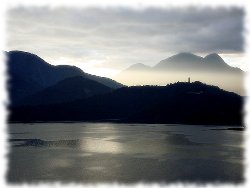陸游 將至京口 translation: Going to Jingkou, by Lu You
This is a translation and annotation of the poem 將至京口 (Jiāng Zhì Jīng Kǒu), by the Song dynasty poet 陸游 (Lu You). The poem is also known by its first line: 臥聽金山古寺鍾 (Wò Tīng Jīnshān Gǔsì Zhōng).
將至京口 Jiāng Zhì Jīng Kǒu [will] [go to] [Jing] [Kou] Going to Jingkou
臥聽金山古寺鍾, Wò tīng Jīnshān gǔsì zhōng, [crouch] [listen] [Gold] [Mountain] [old] [temple] [bell] Kneeling, one listens to the old temple bells on Gold Mountain;
三巴昨夢已成空。 Sānbā zuó mèng yǐ chéng kōng. [San] [Ba] [yesterday] [dream] [already] [finish] [unoccupied] last night in Sanba, one dreamt of retirement.
船頭坎坎回帆鼓, Chuántóu kǎn kǎn huí fān gǔ, [boat] [head] ['splash'] ['splash'] [return] [sail] [swell] The prow of the boat splashes as the sail swells;
旗尾舒舒下水風。 qí wěi shū shū xiàshuǐ fēng. [flag] [tail] [stretch] [stretch] [down] [water] [wind] the flags stretch out downstream in the wind.
城角危樓晴靄碧, Chéng jiǎo wēilóu qíng ǎi bì, [city wall] [corner] [high] [building] [fine] [mist] [blue-green] At the city's corner towers there is a fine blue mist;
林間雙塔夕陽紅。 lín jiān shuāng tǎ xīyáng hóng. [forest] [between] [pair] [pagoda] [dusk] [sun] [red] in the forest, between pagodas, the setting sun is red.
銅瓶愁汲中霝 水, Tóng píng chóu jí zhōng líng shuǐ, [copper] [bottle] [worry] [draw water] [in] Worrying if there is still wine in the copper pitcher,
不見茶山九十翁。 bùjiàn Cháshān jiǔshí wēng. [not] [see] [Tea] [Mountain] [nine] [ten] [old man] an ninety-year-old man who has not seen tea in the mountains
If you notice a mistake or disagree with the translation, please comment below to improve this resource. You might want to have a read of this, as well.
Notes
京口 is a town in Jiangsu province (江苏), now a district of Zhenjiang city (镇江市).
There are a lot of places named 金山. The one in the poem is Mt Jin in Zhenjiang city, where Jingkou is also located.
三巴 refers to Sichuan, or one of various locations in Sichuan with names containing 巴.
坎坎 seems to represent the sound of the boat cutting through the water.
The character marked red in the penultimate line is actually 氵 + 霝, but doesn’t seem to exist in the UTF-8 character set. Update: Boyler pointed out that the character does exist in the UTF-8 character set, but chances are your system won’t be able to display it.
Links:
- [Song Dynasty Poems - Amazon](http://www.amazon.co.uk/gp/product/0933180829/ref=as_li_ss_tl?ie=UTF8&tag=easasistu-21&linkCode=as2&camp=1634&creative=19450&creativeASIN=0933180829" rel="external nofollow “Song Dynasty Poems [Paperback]")
- [The Old Man Who Does as He Pleases - Amazon](http://www.amazon.co.uk/gp/product/0231101554/ref=as_li_ss_tl?ie=UTF8&tag=easasistu-21&linkCode=as2&camp=1634&creative=19450&creativeASIN=0231101554" rel="external nofollow “The Old Man Who Does as He Pleases: Selections from the Poetry and Prose of Lu Lu (Translations from the Asian Classics) [Paperback]")
- [Grand Canal, Great River: The Travel Diary of a Twelfth-Century Chinese Poet - Amazon](http://www.amazon.co.uk/gp/product/0711227195/ref=as_li_ss_tl?ie=UTF8&tag=easasistu-21&linkCode=as2&camp=1634&creative=19450&creativeASIN=0711227195" rel="external nofollow “Grand Canal, Great River: The Travel Diary of a Twelfth-Century Chinese Poet [Hardcover]")

